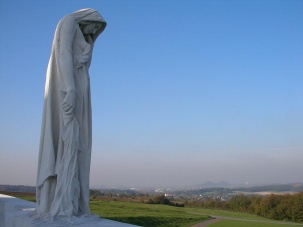A government that recently spent millions of dollars memorializing the War of 1812 plans to spend much more, commemorating the centennial of the First World War and re-dedicating the National War Memorial.
But while those plans are being made to celebrate militarized patriotism, a group called PeaceQuest is busy offering a counter-narrative to war, talking about re-dedicating the Peace Tower — which rises above the Parliament building — and celebrating the yearning for peace that runs through Canada’s history and psyche.
Originating in Kingston, Ont. and with a chapter in Ottawa, PeaceQuest plans to spread to other cities and towns. One of those involved in Jamie Swift, who works in Kingston for a religious order, The Sisters of Providence of St. Vincent de Paul, and is the co-author of a well-received book, called Warrior Nation: Rebranding Canada in an Age of Anxiety.
Says Swift: “The government will use anniversaries of the First World War and Vimy Ridge to extend its narrative about our nation being forged in fire and coming of age through those military events. We view them as a tragedy and not as a great stepping stone to Canadian nationhood.”
PeaceQuest is not interested in a partisan effort or the politics of opposition. “We are more attracted to the politics of proposition,” Swift says. “What we want to do is engage in more of a cultural project that looks at our country in broader terms than its military history. Polling consistently shows that Canadian have a deep attachment to peace and to our reputation as peacekeepers and peacemakers.”
Nor does PeaceQuest intend to create a new organization to which other groups and individuals would belong: “We want to organize around themes that a variety of groups could support in their own ways. In Kingston, we are organized around several streams, including faith, education and culture. For example, we know that the peace theme is central to the Catholic mass and in the religious services of other Christian churches, mosques and synagogues.”
The cultural stream is also important. “There is a lot going on in theatre and literature and music that deals with peace,” Swift adds. He mentions a book, called The Glorious Art of Peace, by author John Gittings and a film called Joyeux Noël, which explains how on Christmas Eve 1914, German and Allied soldiers spontaneously laid down their guns and embraced the men in trenches across the way — an unplanned moment of humanity in an otherwise brutal war.
Canadians and their media love celebrating anniversaries, and the government will use that interest to promote its warrior nation agenda. PeaceQuest, on the other hand, will use those same anniversaries to tap into something more profound.
“War is a tragedy,” says Swift, “but we also want people to consider how they can live in peace with each other in their families and communities, and finally among nations.”
This article was published on the United Church Observer blog on November 13, 2013.



